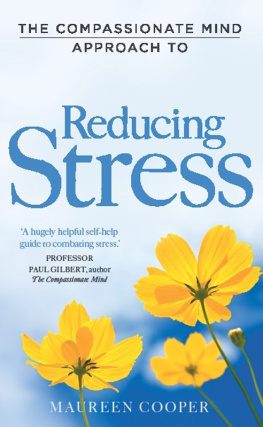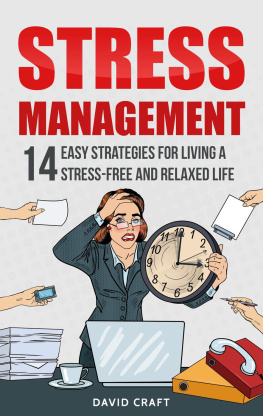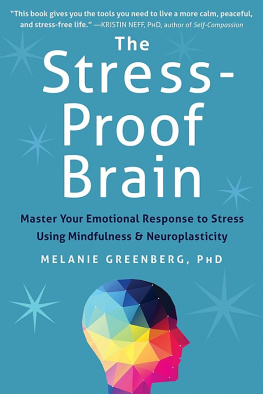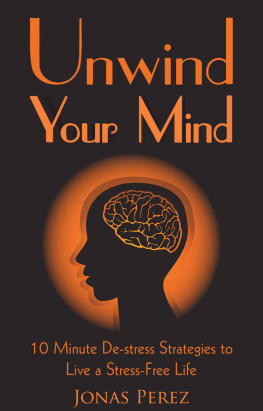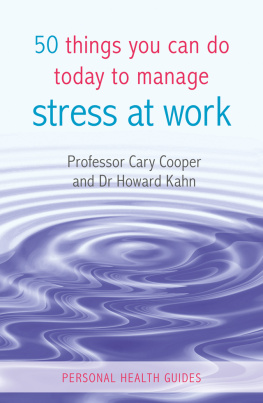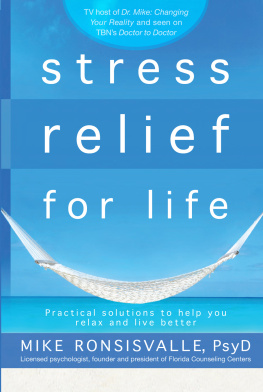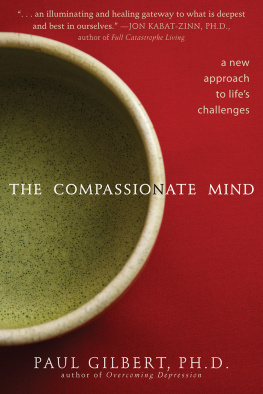Maureen Cooper combines more than thirty years of experience as a professional educator and senior manager in a non-profit organization with a hands-on education in Buddhism. This training enabled her to manage teams and organizations as a practical application of spiritual values. In 2004 Maureen founded Awareness in Action, a consultancy dedicated to the secular application of mindfulness, meditation and compassion in the workplace. As part of this work she has designed and conducted workshops and training programmes worldwide.
If you want to find out more about Awareness in Action visit
www.awarenessinaction.org ,
or contact Maureen on
THE COMPASSIONATE MIND
APPROACH TO
REDUCING STRESS
MAUREEN COOPER
ROBINSON
London
Constable & Robinson Ltd
5556 Russell Square
London WC1B 4HP
www.constablerobinson.com
First published in the UK by Robinson,
an imprint of Constable & Robinson Ltd., 2013
Copyright Maureen Cooper, 2013
The right of Maureen Cooper to be identified as the author of this work has been asserted by her in accordance with the Copyright, Designs and Patents Act 1988.
All rights reserved. This book is sold subject to the condition that it shall not, by way of trade or otherwise, be lent, re-sold, hired out or otherwise circulated in any form of binding or cover other than that in which it is published and without a similar condition including this condition being imposed on the subsequent purchaser.
A copy of the British Library Cataloguing in
Publication data is available from the British Library.
Important Note
This book is not intended as a substitute for medical advice or treatment. Any person with a condition requiring medical attention should consult a qualified medical practitioner or suitable therapist.
Although we have tried to trace and contact copyright holders before publication, this has not been possible in all cases. If notified, the publisher will be pleased to correct any errors or omissions at the earliest opportunity.
ISBN 978-1-84901-201-0 (paperback)
ISBN 978-1-84901-921-7 (ebook)
Printed and bound in the UK
1 3 5 7 9 10 8 6 4 2
Cover design: ClarkevanMeurs Design; Cover image Shutterstock
This book is dedicated to everyone who has felt stressed at times in his or her life and who has the wish to do something about it.
May this book be of use to you!
Contents
ACKNOWLEDGEMENTS
My first thanks must go to Paul Gilbert for asking me to write this book. In all my dealings with him, I experience him as someone who is trying to live a compassionate life rather than just talk about it. Fritha Saunders from Constable and Robinson has been a patient and consistent guide and has taught me a great deal.
This book could not have been written at all without my study and practice of Buddhism, which has been guided over the years by my teacher Sogyal Rinpoche. He has shown me that it is possible to live these extraordinary teachings in the West, in the twenty-first century, with complete authenticity and commitment.
My partner, Bert van Baar, is my fiercest and kindest critic, reading every word I wrote sometimes several times over. He has selflessly accompanied me through every phase of this project, providing feedback, love and encouragement every step of the way.
My dear friend and colleague in Awareness in Action, Darran Trute, has been an unfailing source of support and inspiration as this book has unfolded and provided me with inspiration when I needed it. His wife Mandy has provided kindness and love throughout.
To my dear friends Susan Burrows, Patrick Gaffney, Astrid and Marc Heijdeman, Nel de Jong, Mireia Pretus, Annemiek Schrijver and Gertie Werner-Baumer thank you for believing that I could make this book happen and for continuing to talk with me about it as it unfolded.
Finally, my deepest appreciation and thanks go to all the people who attend my workshops and who have provided so much of the material for this book. I continue to learn from every workshop group I encounter.
PREFACE
Stress is associated with a whole range of lifes difficulties. Not only can it affect our mood, anxiety and irritability, but also fatigue and general physical wellbeing too. Very few of us will go through life without feeling some degree of stress. In fact, we live in a world of mounting stress in todays increasingly competitive and financially insecure world. Things around us seem to move faster and can feel like they are more unstable. Despite increases in wealth, research suggests that, in general, younger people feel more stressed and less happy than they did thirty years ago.
Many of us are seeking ways to slow down and find points of stability in this increasingly hectic life. In this book, Maureen Cooper brings her many years of experience of working with stress, both at an individual and organizational level, to explore the nature of stress. She outlines how it affects our bodies, minds and relationships but also the way we can find moments of calm through mindfully cultivating a more compassionate attitude to ourselves and others. In fact, its long been understood that developing the ability to become more kind, encouraging and compassionate towards ourselves, others and life in general, is very conducive to our wellbeing. Indeed, recent advances in scientific studies of mindfulness and compassion have greatly advanced our understanding of how compassion, both from ourselves and from others, can really help us to treat ourselves in ways that are respectful and which increase our sense of wellbeing.
This research tells us that if we learn to be more attentive to the present moment and to what is going on in our minds and bodies, and if we learn to value and respect ourselves and treat ourselves and others with kindness, even when things are going wrong and we are stressed, we are much more likely to be able to cope with setbacks and stress. In this book Maureen Cooper uses her wealth of experience and knowledge of work-related and other forms of stress to guide readers to work with stress in more supportive and beneficial ways. She explores why our evolved brain is now so susceptible to stress and unhappiness in the rushed world we live in, where we quickly feel judged and vulnerable to criticism and even rejected by others for not being good enough.
Key to this approach is understanding our mind better and how it evolved. One of the first steps to achieving mindfulness is to recognize that the way our brain has evolved means that our capacity for thinking, ruminating, planning, anticipating and imagining although generally very helpful can also cause us difficulties and make us feel stressed. Unlike other animals, we have a brain that is constantly thinking and judging. Imagine a zebra running away from a lion. Once the zebra has escaped, it will shortly settle down to feed again. However, in a similar scenario, a human is unlikely to immediately relax and easily move on to the next thing; we can spend days ruminating about what would have happened if we had got caught and fantasizing about the most horrible outcomes. Zebras and chimpanzees dont worry about what theyre thinking, what they look like or what other chimpanzees might be thinking about them! Humans, on the other hand, do often very frequently. We look in the mirror and think, Oh gosh, is that really me now? How come I have put on so much weight?
We also think about our internal worlds fantasies, thoughts and feelings and we can be critical of those too. Life becomes full of shoulds and shouldnts, oughts and ought nots, or even musts and must nots. Again, no other animal gets stressed because of the way they think, judge, plan, imagine, anticipate and ruminate, but of course humans do all the time.
Next page
